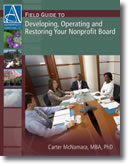@Copyright Carter McNamara, MBA, PhD
Guidelines to Prepare Board Training
Learn More in the Library’s Blogs Related to Board Training
In addition to the articles on this current page, see the following blogs which have posts related to guidelines for board training. Scan down the blog’s page to see various posts. Also, see the section “Recent Blog Posts” in the sidebar of the blog or click on “Next” near the bottom of a post in the blog.
Board training conveys the knowledge and understanding needed by board members in order to effectively carry out their roles as members of the organization’s board of directors. The selection of particular training topics and training methods depends on the nature and needs of the organization. However, the following guidelines and sample agenda may prove useful to readers as they develop their own approach to board training.
Guidelines to Prepare Board Training
Regarding the Timing of the Session
1. Conduct board training once a year, whether you have new board members or not. It’s amazing how the “basics” helps to ground and integrate the knowledge and understanding of even highly experienced board members. Recurring training also helps to ensure that board members are all “working from the same script”.
2. Conduct board training shortly after new members are elected to the board. This scheduling helps new members quickly gain an understanding of their roles and contributions to the organization. This understanding often increases their participation and fulfillment regarding their roles as board members.
Who Should Be Involved in Planning the Session
3. Design of the board training should include at least the chief executive officer and board chair. Ideally, the organization also has a board development committee whose chair can provide strong participation in the training. If timing permits, discuss ideas with all board members to collect their feedback and review.
Selecting Topics and Materials for Board Training
4. Results of the board self-evaluation should be carefully considered when selecting training topics. For example, if the evaluation indicated the board members don’t understand their roles as board members, then ensure that training places a strong focus on this topic during training.
5. Be sure to include a review of the board manual in the training session. The manual is the key resource for members to collect, organize and reference resources needed to carry out their roles as board members. Members should take seriously their manual and their use of it.
6. Materials you’ll need often include:
a) Board manual (for an idea of contents to include in the manual, see Sample Board Manual Index)
b) Advertising and promotions materials about the organization and its programs
c) Copy of the most recent strategic plan
Members’ Preparation for Training
7. Provide the board training agenda, board manual, and promotional materials to members at least two weeks before the meeting. Ask them to review the materials before the meeting.
NOTE: Many of the materials you may need for training and to present to members are included in the Free Toolkit for Boards in the Free Management Library.
Sample Agenda for Board Training Session
The following agenda should be modified by the organization to meet its own nature and needs. During a review of the topics marked with an “*”, provide a brief presentation about the topic and then provide time for open discussion and to address questions from participants.
|
Topic |
Leader of This Section of the Meeting |
Length of Time (minutes) |
| Welcome | Board chair | |
| Review of agenda* | Board chair | |
| Introduction of participants | Each person introduces themselves | |
| Overview of organization* | The executive director reviews the mission, history, and programs and introduces key staff | |
| Orientation to board manual* | Board chair | |
| Roles and responsibilities of governing board* | The board chair reviews the overview of roles, the role of the chief executive, and comparison of roles of board and staff |
|
| Overview of board structure | Review a listing of current officers, committees, and committee chairs |
|
| Overview of board operations* | The board chair reviews key points from bylaws and board policies, board operations calendar, sample committee work plans, and sample meeting agenda and minutes | |
| Review of strategic plan* | The board chair reviews the format of the plan, highlights from the plan and key points about status of implementation of the plan |
|
| Administrative activities | For example, set the schedule for next year’s board meetings, refine the board operations calendar, update the list of board members, etc. | |
| Next steps | The board chair poses reminders of upcoming activities and events | |
| Meeting evaluation | Board chair |
Return to Free Complete Toolkit for Boards
For the Category of Boards of Directors:
To round out your knowledge of this Library topic, you may want to review some related topics, available from the link below. Each of the related topics includes free, online resources.
Also, scan the Recommended Books listed below. They have been selected for their relevance and highly practical nature.
 Sections of this topic
Sections of this topic

















